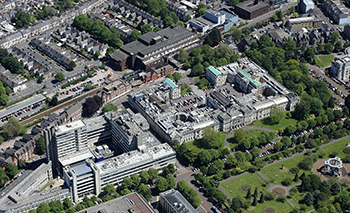Cardiff University Selects Architect for $110 Million Project
 CARDIFF, Wales — Cardiff University in Cardiff is making good on plans to invest roughly £300 million (more than $425 million) in cutting edge new research and teaching facilities. The university announced its ambitious plan to construct four new facilities, together forming a new Innovation Campus, in October 2014, and recently selected an architect to design a key component of the complex.
CARDIFF, Wales — Cardiff University in Cardiff is making good on plans to invest roughly £300 million (more than $425 million) in cutting edge new research and teaching facilities. The university announced its ambitious plan to construct four new facilities, together forming a new Innovation Campus, in October 2014, and recently selected an architect to design a key component of the complex.
Cardiff University will work with the London office of global architecture firm HOK to design the new $110 million Translational Research Facility. The 129,000-square-foot research hub will accommodate two planned institutes: Cardiff Catalysis Institute and the Institute for Compound Semiconductors.
“We are delighted to have been selected by Cardiff University to design this visionary new research facility,” said Adrian Gainer, regional leader of Science + Technology based in HOK’s London office, in a statement. “We look forward to creating cutting-edge facilities that will reinforce the university’s international reputation as a leading catalysis research center and build on its strengths in the development of semiconductor devices and materials.”
Cardiff University has embarked on a comprehensive expansion of its existing campus, according to a statement by HOK. By focusing on innovation, the university hopes to engage with the private sector to generate commercial revenue streams to support significant research programs. By also working in partnership with key stakeholders and investing in facilities and people, the university hopes to become a magnet for enterprise, creativity and innovation. The Translational Research Facility in particular will support multidisciplinary research, turning academic research and innovation into practical, real-world applications delivering benefits for society, healthcare, culture and the economy, according to a statement by the university.
“We are looking forward to working with HOK to deliver the Translational Research Facility, which will act as a crucible for the university’s innovative translational research,” said Professor Hywel Thomas, pro vice-chancellor of research, innovation and engagement at Cardiff University, in a statement. “Innovation is our lifeblood and runs through all we do. Creating the Innovation Campus will help leading researchers and entrepreneurial students turn research into real world answers, bringing social and economic benefits to Wales and beyond.”
As a whole, the new campus will also reinvigorate the former industrial space for which it is planned into a cutting-edge campus. In addition to the Translational Research Facility, the campus will include the Social Science Research Park, which would act as a magnet for national and international research leaders, and increase capacity for research and collaborative learning; the Innovation Center, which will offer start-up companies high-quality, affordable space, advice and support; and the Research Institute for Compound Semiconductor Technology, which would demonstrate and test compound semiconductor technology in realistic environments.
Further plans for the new campus include a practitioners/innovators-in-residence program, high-level training and skills development for postgraduate students and the development of existing enterprise education and opportunities to strengthen the culture of entrepreneurial and innovative thinking among students, according to a statement by the university.
HOK will specifically provide architectural and lead consultant services for the Translational Research Facility. Other project team members include the UK offices of Englewood, Colo.-headquartered CH2M, which is providing mechanical, electrical, structural and civil engineering services; Buro Four of London, which is providing project management services; and cost consultant Faithful and Gould of London. HOK has also been awarded Phase II of the development, which has not yet been defined.
